
Our Mission
Through broad community engagement, the JES-CO initiative accomplishes six goals:
Align a new group of state-wide collaborators committed to shutting down the School to Prison Nexus (STPN) at the intersection of school re-enrollment and continuation
Gather 100 community voices to develop empathy and understanding of the educational barriers for adjudicated youth
Develop a community-driven, lay friendly version of a Justice Engaged Student Bill of Rights (JESBOR) that provides guidance for navigating common challenges
Recommend and pursue legislative fixes that enable the provisions in the JESBOR
Develop and offer training for how to support justice engaged youth to other youth, families, community-based organizations, justice, education, health & human services personnel
Seek state funding for an adjudicated youth hotline (similar to Safe to Tell & I Matter) where students and families can receive guidance and support for school re-enrollment and success
